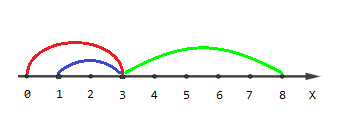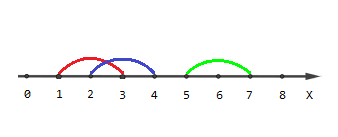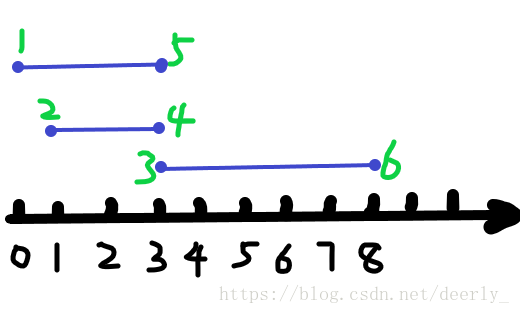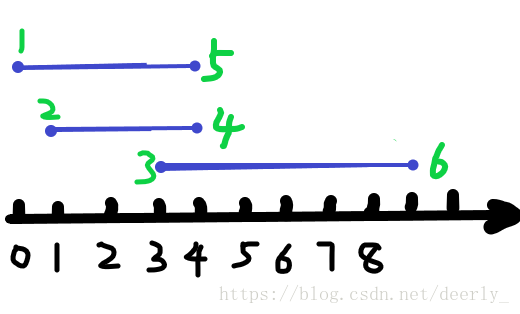C. Covered Points Count
time limit per test
3 seconds
memory limit per test
256 megabytes
input
standard input
output
standard output
You are given nn segments on a coordinate line; each endpoint of every segment has integer coordinates. Some segments can degenerate to points. Segments can intersect with each other, be nested in each other or even coincide.
Your task is the following: for every k∈[1..n]k∈[1..n], calculate the number of points with integer coordinates such that the number of segments that cover these points equals kk. A segment with endpoints lili and riri covers point xx if and only if li≤x≤rili≤x≤ri.
Input
The first line of the input contains one integer nn (1≤n≤2⋅1051≤n≤2⋅105) — the number of segments.
The next nn lines contain segments. The ii-th line contains a pair of integers li,rili,ri (0≤li≤ri≤10180≤li≤ri≤1018) — the endpoints of the ii-th segment.
Output
Print nn space separated integers cnt1,cnt2,…,cntncnt1,cnt2,…,cntn, where cnticnti is equal to the number of points such that the number of segments that cover these points equals to ii.
Examples
input
Copy
3
0 3
1 3
3 8
output
Copy
6 2 1
input
Copy
3
1 3
2 4
5 7
output
Copy
5 2 0
Note
The picture describing the first example:

Points with coordinates [0,4,5,6,7,8][0,4,5,6,7,8] are covered by one segment, points [1,2][1,2] are covered by two segments and point [3][3] is covered by three segments.
The picture describing the second example:

Points [1,4,5,6,7][1,4,5,6,7] are covered by one segment, points [2,3][2,3] are covered by two segments and there are no points covered by three segments.
分析:
比赛时候确实没想出这个1,-1确实妙啊。
思路:
把每个线段的起点终点分别存起来,起点标记为1,终点标记为-1,然后按照起点终点的位置排序。说不清,放个图吧。
比如
3
0 3
1 3
3 8
这组样例,排完序之后的顺序就是图中绿色的编号。 
我们发现,1点的标记是1,二点的标记也是1,证明他们都是起点,一开始我们设一个计数变量,我们发现点被覆盖的次数就是计数变量原来的值加上当前点的标记,这就是为什么要给起点终点标记为1,-1了。然后到达一个起点或终点的时候,只需要后边的点的编号减去前边的点编号就是我们要的被覆盖的点的个数了。
但是有个地方就变得很难处理了,我们发现345这三个点重合了,按照原来的方式求的就不对了。怎么办呢。
只要把终点往后移一个就ok了。 
转自:https://blog.csdn.net/deerly_/article/details/80845448
代码实现:
编译错误(code block)能实现
#include <bits/stdc++.h>
#define cl(a) memset(a,0,sizeof(a))
using namespace std;
const int maxn=1e5+50;
const int inf=0x3f3f3f3f;
const int mod=1e9+7;
typedef long long ll;
typedef pair<ll,ll> E;
vector<E>a;
ll ans[maxn];
int main()
{
ios::sync_with_stdio(false);
cin.tie(0);
cout.tie(0);
int n;
cin>>n;
cl(ans);
for(int i=1;i<=n;i++)
{
ll x,y;
cin>>x>>y;
a.push_back({x,1});
a.push_back({y+1,-1});
}
sort(a.begin(),a.end());
int now=0;
for(int i=1;i<a.size();i++)
{
now+=a[i-1].second;
ans[now]+=a[i].first-a[i-1].first;
}
for(int i=1;i<=n;i++)
{
cout<<ans[i]<<" ";
}
return 0;
}AC代码:
#include<iostream>
#include<cstdio>
#include<cmath>
#include<cstring>
#include<algorithm>
#include<vector>
using namespace std;
typedef long long ll;
const int maxn = 2e5 + 100;
struct node {
ll l;
int is;
};
bool cmp(node a,node b)
{
if(a.l==b.l)
return a.is>b.is;
else
return a.l<b.l;
}
vector<node> data;
ll ans[maxn];
int main()
{
int n;
scanf("%d", &n);
ll s, e;
for(int i = 0; i < n; i++) {
scanf("%lld %lld", &s, &e);
data.push_back((node) {s, 1});
data.push_back((node) {e + 1, -1});
}
sort(data.begin(), data.end(),cmp);
int len = data.size();
int cnt = 1;
for(int i = 1; i < len; i++) {
ans[cnt] += data[i].l - data[i - 1].l;
cnt += data[i].is;
}
for(int i = 1; i <= n; i++) {
printf("%lld%c", ans[i], i == n ? 'n' : ' ');
}
}
最后
以上就是结实唇彩最近收集整理的关于CodeForces - 1000C. Covered Points Count 好题的全部内容,更多相关CodeForces内容请搜索靠谱客的其他文章。








发表评论 取消回复